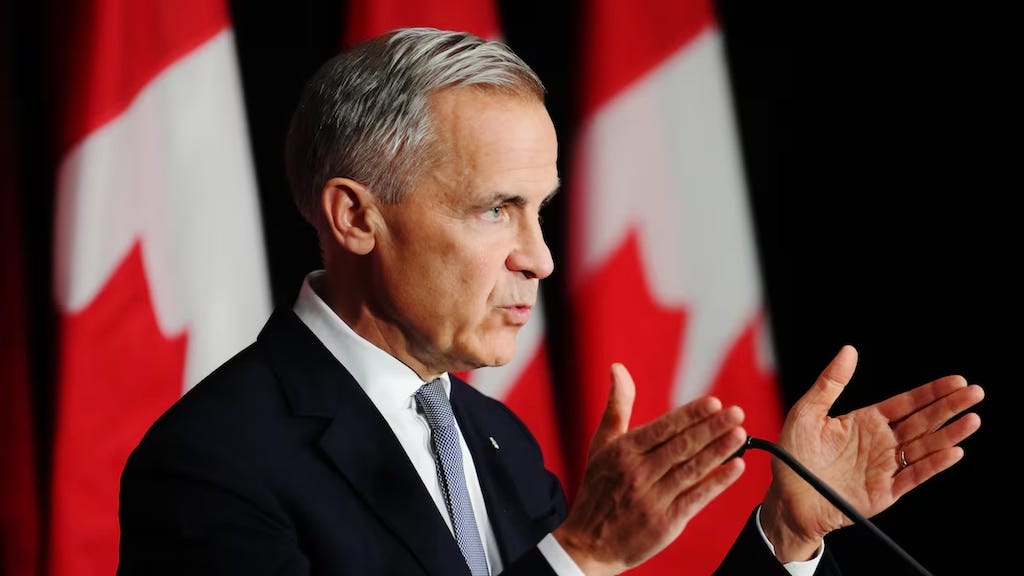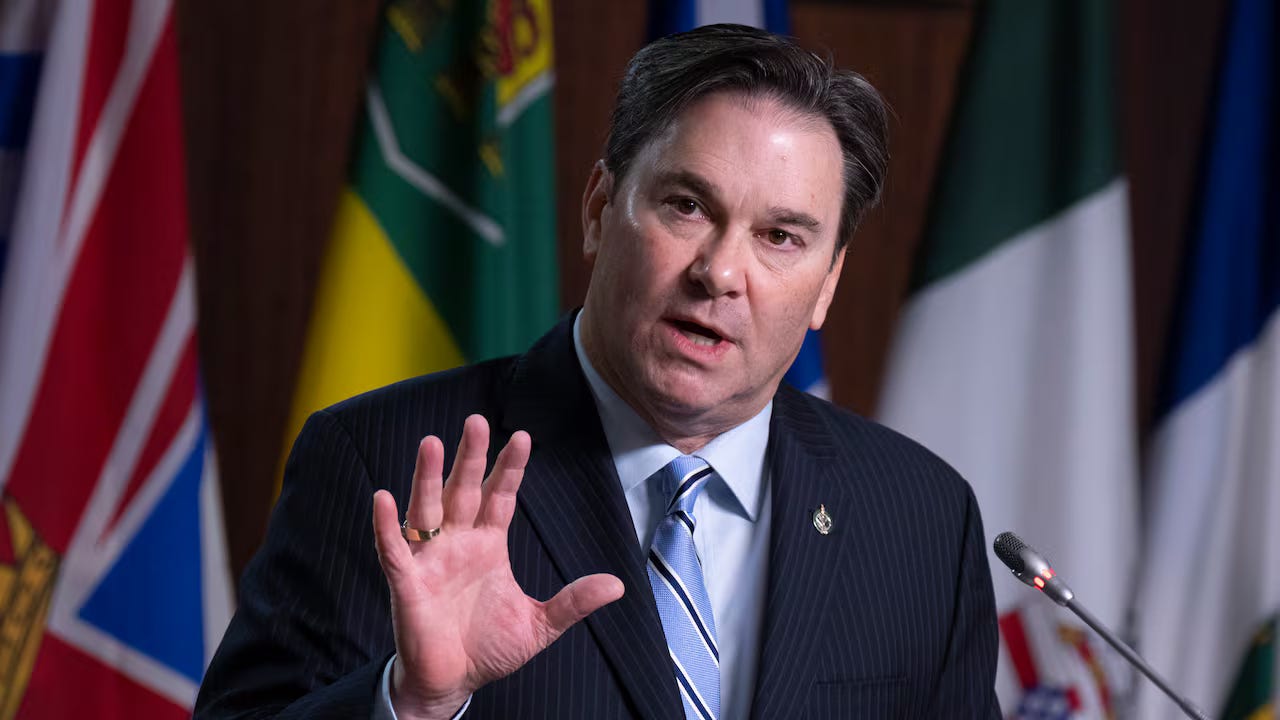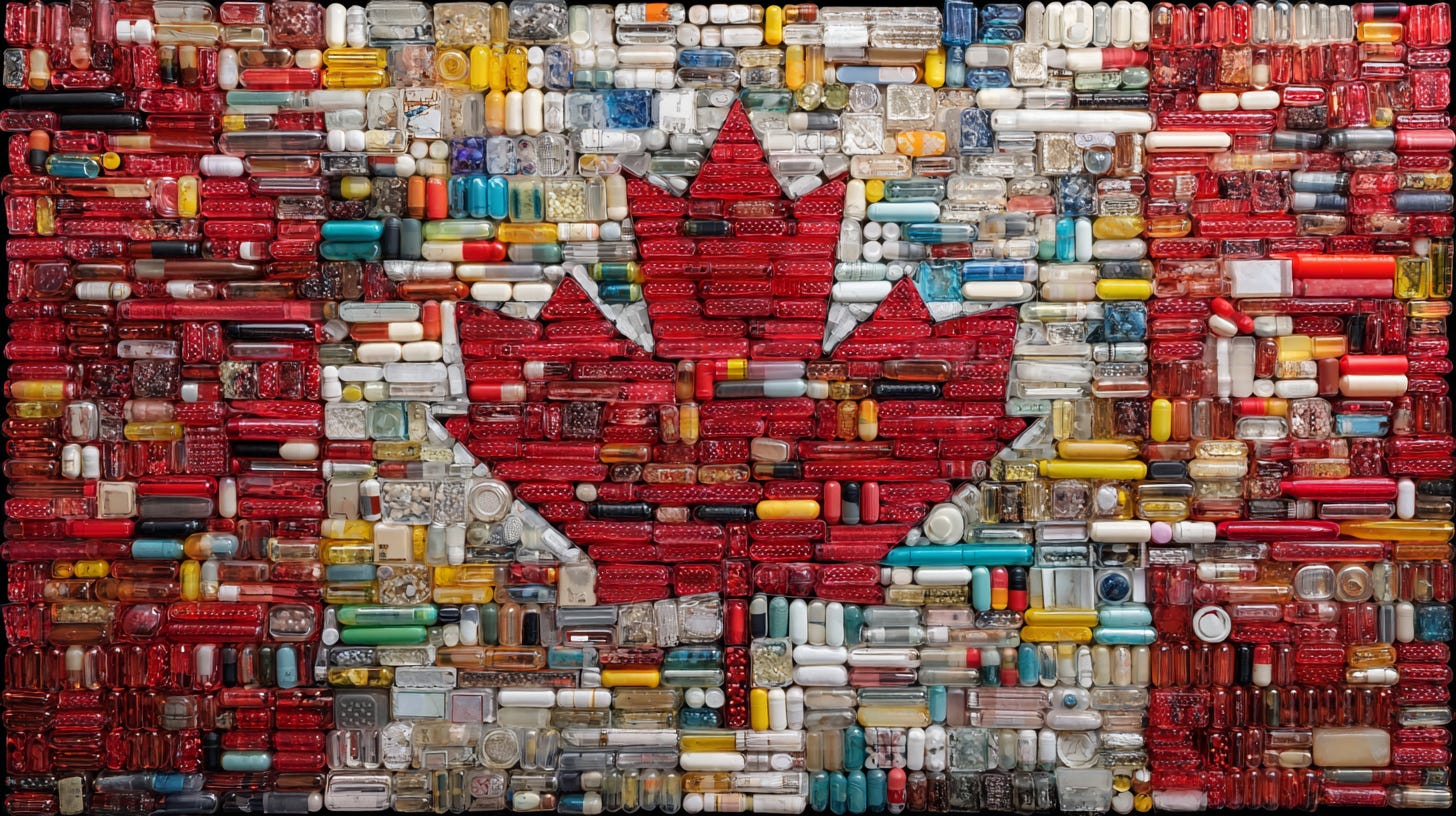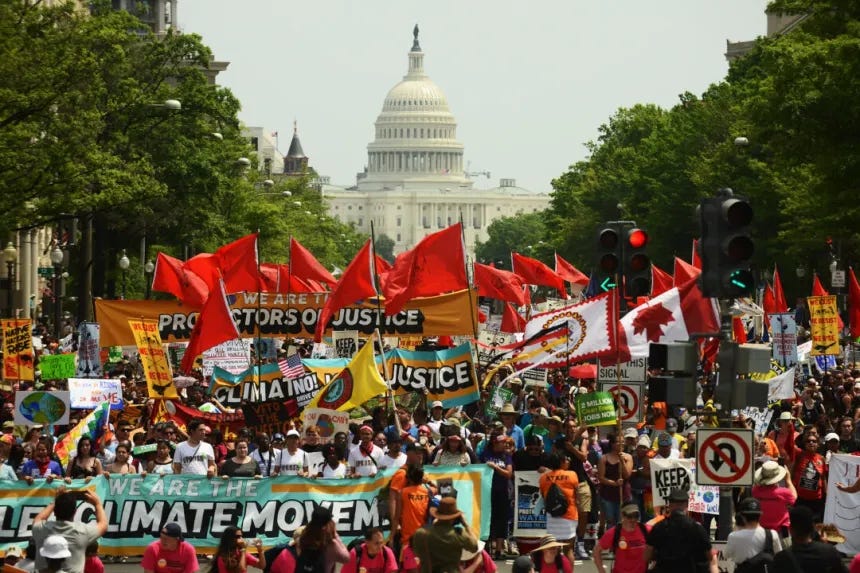Good morning, it’s Tuesday, November 4th. In today’s news, Mark Carney’s “sacrifices” speech exposes the brutal truth about Canada’s future, The NDP are propping up the Liberal budget instead of standing up for Canadians, How Canada hides its role in the global drug trade, Health Canada to allow cloned meat sales with no labelling, and much more.
First time reading the daily blend? Sign up here.
Mark Carney’s “Sacrifices” Speech Exposes the Brutal Truth About Canada’s Future
When Canada’s new Prime Minister Mark Carney warned students to brace for “sacrifices,” he wasn’t talking about some distant challenge; he was acknowledging that the next generation will inherit a nation already in decline. For young Canadians, this wasn’t news. They’ve felt it every day in grocery aisles, on job boards, and in the fading sense that hard work still leads somewhere.
Across campuses, students are bracing for a future that looks less promising than the one their parents knew. The cost of living has soared, housing is unattainable, and the youth unemployment rate has hit nearly 15 percent — the highest since the aftermath of the 2008 crisis. Many students now rely on food banks and scholarships just to survive on “$100 a week.” These aren’t luxuries. They are survival budgets in one of the wealthiest nations on earth.
Carney’s remarks about “sacrifice” would be easier to swallow if they came after years of responsible leadership. But they don’t. They come after a decade of reckless spending, anti-industry policy, and record immigration without matching housing supply — all of which have eroded the living standards of young Canadians. It’s not that the future requires sacrifice; it’s that past mismanagement has left nothing but sacrifice to offer.
Meanwhile, economists offer polite optimism. They speak of “bright futures” and “soft skills,” as if the problem were résumés rather than structural rot. We’ve built an economy where speculation is rewarded more than work, where inflation eats away at every dollar earned, and where government promises of “affordable housing” amount to little more than another bureaucratic agency.
This generation is waking up to the reality that the social contract they were promised no longer exists. They were told that education, persistence, and civic faith would deliver stability. Instead, they’re graduating into a hollow economy run by people who believe “sacrifice” means the public must pay for elite mistakes.
If there’s any lesson in all this, it’s that Canada’s young people are not facing an inevitable storm — they’re living in one that was created. And until the architects of this decline are held accountable, “sacrifice” will remain less a virtue and more a euphemism for failure. Source.
‘All Options On the Table’: NDP Propping Up the Liberals Instead of Standing Up for Canadians
The NDP is once again pretending to “keep all options open” on Mark Carney’s budget, including the option to abstain, which is just code for quietly keeping the Liberals in power while pretending to oppose them.
Interim leader Don Davies says they’ll “read the budget carefully” and “analyze it through the lens of working people,” but that’s the same line we’ve heard every time they’ve cut a backroom deal with the Liberals. They’re buying time to find a way to justify another sellout to their base.
Meanwhile, even within their tiny caucus, cracks are showing. MP Jenny Kwan has already said she won’t abstain, while others like Leah Gazan are trying to sound tough by rejecting an “austerity budget," but without actually committing to vote against it.
The Liberals, three seats short of a majority, desperately need another party’s support or abstentions to survive. And once again, the NDP is perfectly positioned to bail them out—because every time push comes to shove, they do.
So let’s call it what it is: this isn’t a principled stand or some clever negotiating tactic. It’s political cowardice. The NDP can’t decide whether it wants to oppose the government or be the government’s safety net.
At this rate, don’t be surprised if the NDP completely folds into the Liberal Party or disappears altogether. Because if you spend enough time propping up the people you’re supposed to oppose, eventually, no one can tell the difference.
The Lie of the “1%”: How Canada Hides Its Role in the Global Drug Trade
Every time you mention Canada’s undeniable role in the international criminal economy, the same thing happens: defensive Canadians rush in, elbows up, insisting that their country couldn’t possibly be part of the problem. They’ll say it’s all Mexico. And when pushed, they’ll throw out a comforting statistic — that less than 1% of fentanyl seized at the U.S. border comes from Canada.
But that number doesn’t mean what people think it means.
The less than 1% figure refers only to drugs physically seized at the border. It doesn’t capture what’s produced in Canada and moved through domestic or inland routes before crossing south. Nor does it count seizures deep inside the U.S., like those found along interstates or in warehouses, that aren’t traced back to Canadian sources. In other words, if Canadian-produced fentanyl ends up in a Chicago suburb or a Detroit distribution hub, it often disappears from the data — not from reality.
Then there’s the issue of detection. Roughly one-third of cargo entering the U.S. from Mexico is scanned with modern inspection systems. At the Canadian border, that number drops to around 5%. The difference isn’t minor — it’s the difference between catching contraband and missing it entirely. Fewer inspections mean fewer busts, which in turn make the statistics look cleaner than the reality. The illusion of purity is created by the absence of scrutiny.
And behind it all lies the money. Canadian law enforcement agencies estimate between $45 billion and $113 billion is laundered through Canada’s economy every year — placing it among the country’s largest industries. These funds move through real estate, shell companies, and casinos, often tied to drug trafficking and organized crime. When the same financial networks that clean criminal money are protected by policy and political apathy, the lines between legality and corruption blur.
So when someone cites the 1% statistic as proof that Canada isn’t a “major player,” they’re not defending reality — they’re defending a national delusion. The problem isn’t that Canada’s hands are clean. It’s that they’re covered in invisible ink.
Until Canadians stop mistaking low seizure numbers for innocence, they’ll continue to live in denial of a simple fact: you can’t find what you refuse to look for.
Health Canada to Allow Cloned Meat Sales with No Labelling, Leaving Consumers in the Dark
Health Canada is quietly moving to allow meat from cloned cattle and pigs to be sold without special labelling, treating it the same as conventionally bred meat. Foods derived from clones of other animals, such as goats and sheep, are still regulated as novel foods. The decision follows international safety assessments and a 2024 consultation that involved fewer than 1,200 individuals and organizations and was not widely publicized. Experts warn that the lack of transparency could damage consumer trust, even as cloning offers farmers faster breeding, higher productivity, and lower costs. Ethical concerns and consumer “ick factor” remain, but the government is not requiring labels, leaving shoppers largely in the dark. More
Report: Foreign Charities Contributed $2 Billion to Left-Wing Groups and Policies in the US
According to Americans for Public Trust, foreign charities have funneled nearly $2 billion into US left-wing climate and social justice agendas—with at least one donor linked to the Chinese Communist Party. Major contributors include the Children’s Investment Fund Foundation ($553M since 2014), Quadrature Climate Foundation ($530M since 2019), KR Foundation ($36M), Oak Foundation ($8.2M), and Laudes Foundation ($20M). These funds influence lobbying, litigation, protests, think tanks, and other policy advocacy, exploiting loopholes that allow foreign groups to shape US policy without direct campaign involvement. Experts warn this unchecked foreign funding threatens US sovereignty and energy independence. More
Liberals Cancelling Trudeau-Era Plan to Plant Two Billion Trees - The program launched in 2021 is being dropped as part of a spending review to find billions of dollars worth of savings. More
’Genocide in Gaza’: Jewish Groups Call for Olivia Chow to Apologize and Resign for Anti-Israel Remarks - More
SNAP Update: Trump Admin Will Pay 50% of Food Stamp Benefits in November Amid Shutdown - More
Liberals to Unveil Changes to Canada’s EV Sales Mandate this Winter - More
Two Men Charged for Allegedly Plotting ISIS-Linked Halloween Attack - They were allegedly scouting LGBT bars in the Detroit area to carry out a violent attack over the holiday weekend. More
US Threatens Military Attack on Nigeria in Response to Alleged Persecution of Christians - More
$120 Million Crypto Hack Shakes Trust in Decentralized Finance
Early Monday, Balancer, a popular decentralized finance (DeFi) platform where users trade and pool crypto automatically, was hacked, costing users $120 million or more. The exact method of the attack is still unclear, but it appears the hacker manipulated the system to make massive profits. Even though Balancer has been around since 2020 and has undergone multiple security audits, this shows that DeFi platforms, even well-reviewed ones, are still vulnerable.
The incident has shaken trust in the wider DeFi ecosystem, with experts warning that it could slow adoption significantly. Other projects built on Balancer’s code were also affected, and at least one blockchain, Berachain, temporarily shut down to fix the fallout. The hacker reportedly used Ethereum from Tornado Cash, a privacy-focused service, to fund the exploit, making recovery of the stolen funds difficult if not impossible.
The main takeaway isn’t just the money lost, it’s that even long-standing, audited crypto platforms can be exploited, raising serious questions about whether decentralized finance can be trusted for large-scale financial use. More
Ottawa Begins Dispute Settlement Proceedings Against Stellantis for Moving Production to the US - More
Kimberly-Clark Buys Kenvue: Tylenol’s Parent Company Will Combine with the Maker of Huggies in a $48.7 Billion Mega-Deal - More
OpenAI and Amazon Ink $38 Billion Computing Power Deal - More
Moon Mining Boom: Helium-3 Gold Rush Fuels US-China Space Race
The US and China are racing to the Moon, aiming for landings by 2028 and 2030, with private companies seeking to mine valuable lunar resources. Helsinki-based Bluefors plans to buy up to 10,000 liters of helium-3 from Moon-mining startup Interlune, a deal potentially worth $300 million. Helium-3, rare on Earth but abundant on the Moon, could power nuclear reactors or cool quantum computers. Extracting it will be extremely challenging, requiring millions of tons of lunar soil and costly equipment.
Other companies, including Jeff Bezos’ Blue Origin, are mapping lunar helium-3 and water ice, which can be converted into drinking water, oxygen, or rocket fuel. Experts say the first nuclear-powered lunar base could control key regions of the Moon, shaping the future of lunar operations. Despite technical hurdles, Interlune plans to send a camera to survey helium-3 concentrations next year, pushing toward a high-stakes lunar gold rush. More
Our Universe Was Twice as Hot 7 Billion Years Ago, Study Reveals - More
First Evidence for a Non-Gravitational Acceleration of 3I/ATLAS at Perihelion - This could be caused by things like gas or dust being ejected from the object (like a comet’s tail) or other physical effects. Alien technology is extremely unlikely and not the default scientific explanation, but it is possible. More
Lawsuit Against Spotify Claims ‘Billions’ of Drake Streams Were ‘Fraudulent’
A new lawsuit alleges Spotify allowed “mass-scale fraudulent streaming,” with Drake’s music reportedly receiving billions of fake plays between January 2022 and September 2025. The complaint claims bots and VPNs artificially inflated streams, skewing payouts and harming other artists. While no wrongdoing is directly accused against Drake, the suit argues Spotify profited from inflated streams by showing higher user activity to advertisers. The proposed class action seeks over $5 million in damages and asks the court to certify it as a class action to recoup losses for affected musicians. More
Barry Bonds and Roger Clemens Get Another Shot at Baseball Hall of Fame in 2026 as Part of a Special Ballot - More
UFC Cuts Isaac Dulgarian Over Alleged Fight-Fixing and Suspicious First-Round Loss - More
Jake Paul vs. Gervonta Davis Officially Cancelled Following Domestic Violence Allegations Against ‘Tank’ - More
Mystery Object Strikes Tesla in Australia—Experts Suggest It Might Be a Meteorite, Potentially a World-First
Farmworkers Hailed as Heroes After Saving 20 Children from Burning School Bus in California
On This Day in 1879, James Ritty Invented the First Cash Register to Stop His Bartenders from Stealing in Dayton, Ohio



















Check out Elizabeth Nickson’s Absurdistan on Substack. She explains that environmentalists have purposely stopped growth in Canada. Try to start a business in rural Canada, and the mountains and cost of regulations will prevent it.